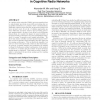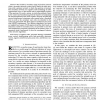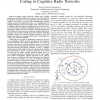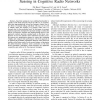293 search results - page 8 / 59 » Opportunistic Multiple Access for Cognitive Radio Networks |
108
click to vote
MOBICOM
2009
ACM
15 years 6 months ago
2009
ACM
In cognitive radio networks (CRNs), spectrum sensing is key to opportunistic spectrum access while preventing any unacceptable interference to primary users’ communications. Alt...
TWC
2008
14 years 11 months ago
2008
We consider a secondary usage of spectrum scenario where a secondary network coexists and/or shares the radio spectrum with a primary network to which the spectrum is licensed. The...
105
click to vote
INFOCOM
2010
IEEE
14 years 10 months ago
2010
IEEE
—Cognitive Radio Networks (CRNs) have recently emerged as a promising technology to improve spectrum utilization by allowing secondary users to dynamically access idle primary ch...
WIOPT
2010
IEEE
14 years 10 months ago
2010
IEEE
In this paper, we propose a comprehensive probabilistic framework which can be used to model and analyze cognitive radio (CR) network using carrier sensing (CS) based multiple acc...
GLOBECOM
2007
IEEE
15 years 6 months ago
2007
IEEE
— Spectrum sensing is a key enabling functionality in cognitive radio (CR) networks, where the CRs act as secondary users that opportunistically access free frequency bands. Due ...




